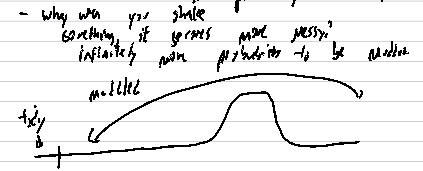Bateson - Steps to an Ecology of Mind
Tags: books, episteme, cognition
Introduction
- Asks “how do ideas interact? Why do some ideas survive while others fail?”
- How to distinguish between the trivial and the profound? What is the difference between the trivial and the profound?
- Notion of the context and the meaning
- carves out into three separations
- The data is not the event itself, but rather the recording of it
- no data can ever truly be “raw”
- the imperfectly defined heuristic concepts
- “ego”, “anxiety”, “instinct”, etc
- the fundalmentals
- laws of thermodynamics, law of large numbers, etc
- The data is not the event itself, but rather the recording of it
- Explanation, therefore, is the mapping of data onto fundalmentals, but the ultimate goal of science is to increase fundalmental knowledge
- states that the social sciences continue to stay within the field of heuristic concepts, inductively testing it against the data in hopes of moving it into the fundalmentals
- asks us to abandon total induction
- obeservations cannot be denied, fundalmentals must be fitted
- prediction is a poor tool for testing a hyposthesis - https://backreaction.blogspot.com/2020/07/einsteins-greatest-legacy-thought.html
- some exegsis on the bible
- what are the things the first few sections of the bible are concerned with?
- problems of order
- origin and nature of matter are not necessarily aligned
- order is seen as sorting and dividing
- sets up a fundalmental threshold
- what are the things the first few sections of the bible are concerned with?
- form vs substance
The conservative laws for energy and matter concern substance rather than form. But mental process, ideas, communication, organization, differentiation, pattern, and so on, are matters of form rather than substance
Chapter 1: Metalogues
- similar to GEB style discussions
Why Do Things Get Into a Muddle?
-
Tidyness vs being muddled
-
people have similar definitions of “muddled”
-
but have extremely varied definitions of being “tidy”
-
bateson implies this is b/c the distribution is skewed towards being muddled

>
Why Do Frenchmen?
- tacits about the difference between tacit knowledge, implicit knowledge and explicit knowledge
- frenchmen use gestures, gestures convey a tacit knowledge
About Games and Being Serious
- what is cheating? what is implied from cheating?
- cheating blog post
How Much Doo You Know?
- What is an arithmetic of ideas?
- idea2vec, can you simply add two ideas together?
- Ideas are typically combined but not added
- When you try to think about two thoughts, are you thinking about two thoughts or one thought about two thoughts?
Outlines
- Do outlines give rise to the concepts or visa versa?
- Outlines show how muddles work together
- Under what conditions does an outline come together?
Swans
- “sacrement” vs metaphor?
Instinct
- Instinct vs explanatory principals
- Any statement linking together two descriptive statements is a hypothesis
- Can simple things learn?
- isomorphic - generating comlpex patterns from simple formulas
- can instincts, even though they are simple, give rise to complex behaviors?
- isomorphic - generating comlpex patterns from simple formulas
- instinct -> practice -> habit loop
- similarities to ooda (observe orient decide act) loop?
- “don’t force hte concepts of language & tools upon dream material”
- dreams vs instincts
- why do we expect dreams to have morals?
- can animals be ironic?
- can animals express a negative intention?
- i.e. “I will NOT bite you”
- does the concept of not arise from langauge?
- do dreams have a not?
- can animals express a negative intention?
- when a metaphor is labeled as a metaphor, it becomes a simile
Part 2: Forms and Patterns in Anthropology
Culture Contacts and Schismogensis
It is not about the set of categories which will throw light on all problems but the schematic formulation of problems in such a way each of them are investigiable
- Can’t construct rules about the world and solve all problems, but can derive rules from specific problems to solve them
- Applications of force & removal of free will
- definitions of a “crimal” type
- false binary, has lead to problems
- impossible to classify these things based on broad cateogries
- definitions of a “crimal” type
- culture cannot be divided into distinct categories
- Malinowski
- Fallacy of misplaced concreteness
- Whitehead
- Three models for culture contact
-
Complete Fusion
- 5 modes of unity
- Structural aspect
- cultural norms are different
- patterns of thought
- Affective - emotionally consistent
- Economic unity - oriented towards the production of objects
- Chronological & spatial - ordered due to time and place
- Sociological - integration of the major unit
- Structural aspect
- 5 modes of unity
-
Elmination
- Less interesting, not worth studying
-
Persistence of both groups in dynamic equilibrium
- Most instructive, different groups can be ordered on different categories abstractions
- symmetrical - clans/villages
- complementary - class/sex
- Most instructive, different groups can be ordered on different categories abstractions
-